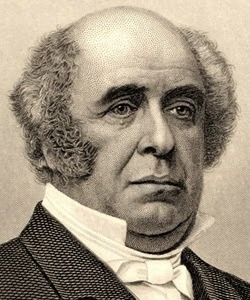Holiness can sometimes look more like something out of “50 Shades of Grey” than something that came out of church.
 Okay. That did it. I was chewing on an idea for a post, feeling like I needed to write it “for the good of all humanity” (ego much?), and then got distracted by this latest tidbit on Facebook: “It is therefore settled, by authority, that holiness or Christian perfection is the central idea of Christianity” (Bishop Jesse T. Peck (1811-1883). I’ve made a half-hearted New Year’s resolution to not respond (or “correct”) every bit of stupid I run across on the interwebs, but sometimes you just gotta…
Okay. That did it. I was chewing on an idea for a post, feeling like I needed to write it “for the good of all humanity” (ego much?), and then got distracted by this latest tidbit on Facebook: “It is therefore settled, by authority, that holiness or Christian perfection is the central idea of Christianity” (Bishop Jesse T. Peck (1811-1883). I’ve made a half-hearted New Year’s resolution to not respond (or “correct”) every bit of stupid I run across on the interwebs, but sometimes you just gotta…
This one is just so typical of the Christian attitude that prevails in Western culture these days that it needs speaking out against.

It’s a philosophy that encourages comparing ourselves against others — and more dangerously, comparing others against some standard the we’ve set up as the true measure of a Christian. It’s bad enough we have all these white-washed churches lining up to throw stones at every “sinner” they encounter in the news, or start the paranoid screaming about how America is going to the dogs because of [fill in the blank]. People putting on their Sunday best — not just clothes for Sunday morning worship, but their Sunday best faces for the rest of the week where they can pretend moral superiority over others who do those “unholy” things, like go to bars, smoke cigarettes (or worse, weed!), or have sex outside of marriage. Hopefully, they’ve evolved past getting upset over tattoos or ear-piercings and choice of clothes, but who knows? In some places, those are still outward signs of inner holiness.
And all these little “standards” just act as tools to measure — judge! — other people. “He’s obviously not saved because he was out last night at the clubs — he even still smells like smoke.” “She needs the Lord, because I heard her boyfriend slept over last night.” “He’s dating a MAN! Lawd ha’ mercy!” We can kinda laugh at these people. They’re living caricatures like you’d see Madea make fun of, or find in an old SNL sketch of the “Church Lady.” They’ve made the church and Christianity a joke in the eyes of normal people.
Does it honestly need to be said yet again that the hallmark of Christianity — at least as defined by Jesus — is love? Love of God and love for each other. Is it loving to judgmentally comment on a person’s clothes as a reflection of their relationship with God? Is it loving, or even truth, to turn up our nose at someone because they’re in an open relationship? Do we reflect the heart of God when we dismiss someone because they have a fondness for leather or BDSM in their personal life? How much less so over stupid stuff like clothes, entertainment, if-what-how-often they drink or smoke, have piercings, their hairstyles, their sexual orientation, or … you name it.
All that stuff is just stupid. Holiness is the degree to which we reflect the heart of God. It has nothing to do with outward appearance, although it should certainly bear outward fruit. The heart of the Father — the fruit of the Spirit — is mostly inward stuff that works its way out in normal, everyday action: love, joy, peace, patience, kindness, faithfulness, goodness, gentleness and self-control. It’s how we think and how we act. Holiness is how we treat each other. And frankly, if the guy who not two hours before was tied to a chair, wearing a leather mask, and getting mental and physical sexual release through being flogged (I’m deliberately painting an image that radically flies in the face of traditional views of “Christian perfection and holiness”) — if this guy stops to help me with a problem that is crushing me, or shares a kind word with me when I need it most, he IS being holy. And you can keep your “saintly perfection” for yourself.
Okay. All this venting really relies on my old-school interpretation of these ideas of “Christian holiness.” They are the “white-washed tombs full of decaying flesh and bones” — tidy and well-kept to some on the outside, but putrid and repugnant to any who dare get close enough for a closer inspection. It’s the stuff I heard in churches growing up and saw in the lives of my friends’ religious families. It is the stuff that has caused most genuinely-seeking individuals hungry for “realness” to turn away from all forms of institutional Christianity. It smells of fakeness and entrapment, of oppression and death.
Give me people who care enough to help me fix my car, or who make sure I have groceries in my cupboards. Give me people who check up on me if they haven’t seen me for a few days on Facebook. Give me people who encourage me, ask me out for coffee or a beer, who want to be part of my life. Give me people who will actually mention my name to God at random times during the day because they’re thinking of me and honestly want God to touch me. Give me that kind of holiness. Because that’s what I’m looking for, and that’s what many people I know — outside of the church — are looking for before they’ll take on the label “Christian” for themselves. Realness. Real love.
“It is therefore settled, by authority, that holiness or Christian perfection is the central idea of Christianity.” Despite my New Year’s intentions, I couldn’t help myself. I commented on that Facebook post: “huh. I thought it was love — loving God, loving others. Guess maybe I’m not holy enough.” And maybe I’m not.
—
photo credit: “Blacklight BDSM” by Beo Beyond on Flickr. cc.
[box type=”bio”]
 STEVE SCHMIDT is a Bible teacher at Expressions in Oklahoma City. He is a graduate of the seminary at Oral Roberts University in Tulsa, OK, and holds two masters degrees in Biblical Literature and Divinity. He did his doctoral research at the Hebrew University of Jerusalem and at the Jewish Theological Seminary of America in New York.
STEVE SCHMIDT is a Bible teacher at Expressions in Oklahoma City. He is a graduate of the seminary at Oral Roberts University in Tulsa, OK, and holds two masters degrees in Biblical Literature and Divinity. He did his doctoral research at the Hebrew University of Jerusalem and at the Jewish Theological Seminary of America in New York.
He is editor of IMPACT Magazine, and blogs here on the Cafe Inspirado column. Plus you can find him making random comments about life on Facebook.
[/box]



